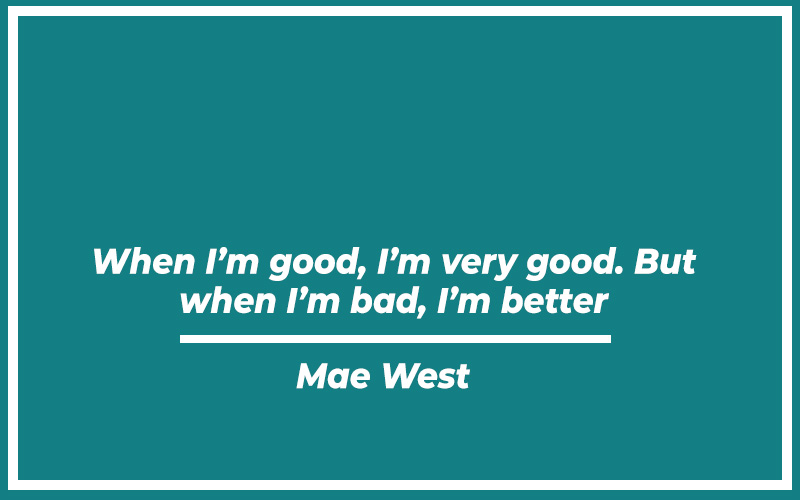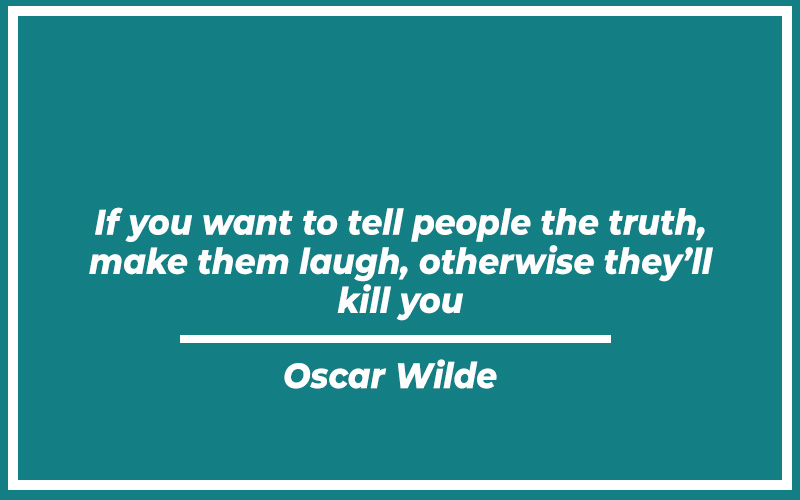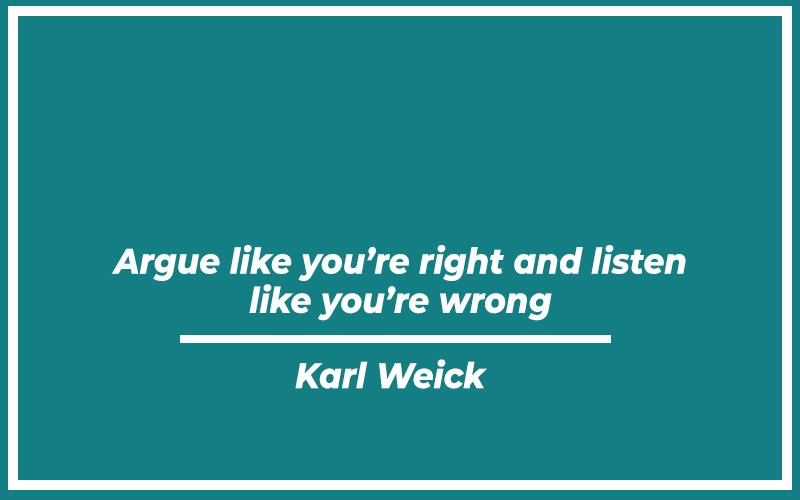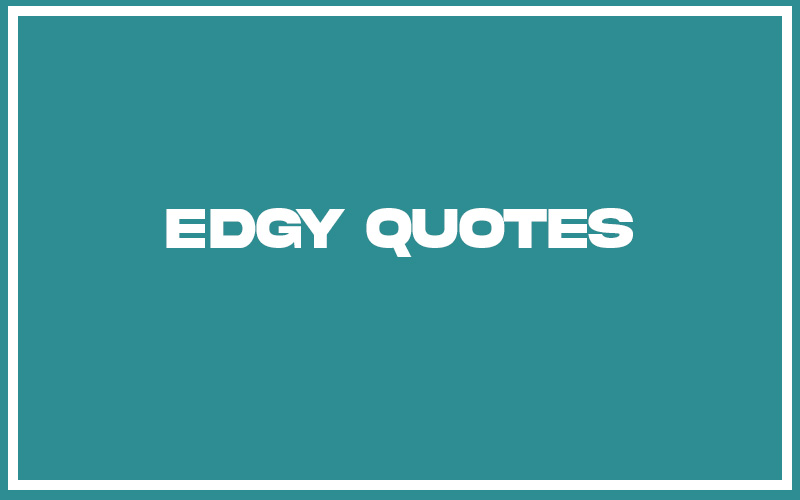Edgy quotes are like those bold, punchy statements that grab your attention. They make you think, laugh, or feel a bit bold.
If you want to say something with a bit of attitude or make a statement that sticks, these quotes are perfect. They can be clever, deep, or just different, but they always stand out.
Best Edgy Quotes

“When I’m good, I’m very good. But when I’m bad, I’m better.” – Mae West
Mae West’s quip reflects her flamboyant defiance of social norms and traditional morality, suggesting a fearless embrace of both her virtues and vices.
This bold assertion of self-acceptance and the intentional blurring of conventional moral lines serves as a powerful statement of autonomy and personal empowerment, encouraging others to own their complexities with confidence.
Also read: Christopher Hitchens Quotes (with Explanation)
“Disobedience is the true foundation of liberty. The obedient must be slaves.” – Henry David Thoreau
Thoreau champions the idea that true freedom requires the courage to disobey unjust norms.
This quote serves as a stark reminder that passive compliance can lead to the erosion of personal liberty. By equating blind obedience with slavery, Thoreau underscores the importance of critical thinking and individual action in the pursuit of social and personal freedom.
“They laugh at me because I’m different; I laugh at them because they’re all the same.” – Kurt Cobain
Kurt Cobain’s reflection on individuality highlights the solitude and strength found in embracing one’s uniqueness against societal conformity.
This quote encapsulates the often painful awareness of difference but also turns it into a source of pride and defiance, suggesting that those who conform lack the courage to embrace their true selves.
“I am free, no matter what rules surround me. If I find them tolerable, I tolerate them; if I find them too obnoxious, I break them.” – Robert A. Heinlein
Heinlein expresses a fierce independence in navigating societal rules, suggesting that true freedom lies in personal choice and the ability to challenge constraints that feel oppressive.
This stance encourages autonomy and resilience, advocating for a personal code of conduct that prioritizes individual beliefs and freedoms over blind adherence to external rules.
“The question isn’t who is going to let me; it’s who is going to stop me.” – Ayn Rand
Ayn Rand’s quote captures the essence of ambitious, unapologetic pursuit of one’s goals, disregarding external permission.
It’s a call to assertiveness and self-empowerment, emphasizing that one should not wait for others’ approval but instead move forward with determination and self-assurance, making one’s own path.
“You will always be too much of something for someone: too big, too loud, too soft, too edgy. If you round out your edges, you lose your edge.” – Danielle LaPorte
Danielle LaPorte’s words encourage embracing one’s unique qualities without compromise.
The quote warns against the dilution of one’s essence to fit others’ expectations, advocating for authenticity and the preservation of what gives each individual their distinctive sharpness and appeal, even if it isn’t universally appreciated.
“I like to be stylish and edgy, but also low maintenance.” – Krysten Ritter
Krysten Ritter’s quote reflects a desire for a balance between standout style and practicality.
It speaks to the modern ethos of maintaining one’s personal style without letting it become a chore, promoting an approach to fashion—and, by extension, to life—that values both individuality and simplicity.
“Anarchism stands for the liberation of the human mind from the dominion of religion and the liberation of the human body from the dominion of property.” – Emma Goldman
Emma Goldman’s quote is a powerful call for radical freedom both intellectually and materially, critiquing the constraints imposed by religion and property.
By advocating for anarchism, Goldman champions a form of liberation that seeks to free individuals from both spiritual and economic shackles, promoting a society where personal and collective autonomy are paramount.
“The only way to deal with an unfree world is to become so absolutely free that your very existence is an act of rebellion.” – Albert Camus
Albert Camus presents a defiant stance against oppression through personal liberation. His quote suggests that in a world where freedom is curtailed, the mere act of asserting one’s freedom becomes a form of protest.
Camus encourages individuals to live so freely that their existence challenges the status quo, turning personal autonomy into a powerful statement against societal constraints.
“The only true wisdom is in knowing you know nothing.” – Socrates
Socrates’ famous declaration from the classical Greek philosophical tradition emphasizes the importance of intellectual humility. By claiming to know nothing, Socrates champions the pursuit of knowledge as an endless journey, where the recognition of one’s ignorance is the first step towards wisdom.
This quote invites reflection on our own limitations and the perpetual quest for deeper understanding.
“Man is condemned to be free; because once thrown into the world, he is responsible for everything he does.” – Jean-Paul Sartre
Jean-Paul Sartre’s existential assertion highlights the burdensome nature of freedom. According to Sartre, freedom is not just an opportunity but a responsibility, where individuals must bear the consequences of their actions without excuse.
This quote challenges us to embrace our freedom responsibly, recognizing the weight of our choices in shaping our lives and the world around us.
“One must still have chaos in oneself to be able to give birth to a dancing star.” – Friedrich Nietzsche
Nietzsche’s metaphorical expression celebrates the creative potential that can emerge from internal turmoil. Suggesting that chaos within oneself can lead to brilliant creations.
This quote encourages embracing the disorder and unpredictability in one’s life as a source of inspiration and transformation, leading to innovation and excellence.
“The reasonable man adapits himself to the world; the unreasonable one persists in trying to adapt the world to himself. Therefore, all progress depends on the unreasonable man.” – George Bernard Shaw
Shaw’s quote critiques conformity and heralds the value of unreasonableness in driving societal progress.
By suggesting that it is the unreasonable individuals who refuse to conform and instead insist on changing the world to fit their visions, Shaw promotes a view of progress that depends on bold, innovative thinking rather than mere adaptation.

“If you want to tell people the truth, make them laugh, otherwise they’ll kill you.” – Oscar Wilde
Oscar Wilde’s witty remark encapsulates the power of humor as a tool for conveying uncomfortable truths.
Suggesting that laughter can disarm and open minds, Wilde advises that wrapping hard truths in humor can make them more palatable and effective, allowing for critical reflection in a way that direct confrontation might not.
“I am so clever that sometimes I don’t understand a single word of what I am saying.” – Oscar Wilde
Oscar Wilde’s statement is a playful nod to the complexity and wit often embedded in his writing. This self-deprecating humor not only highlights his linguistic prowess but also critiques the obscurity that can accompany intellectual discourse.
Wilde’s quote encourages an appreciation of cleverness while also poking fun at the sometimes inaccessible nature of highly intellectual statements.
“The trouble with having an open mind, of course, is that people will insist on coming along and trying to put things in it.” – Terry Pratchett
Terry Pratchett humorously captures the downside of open-mindedness. His quote suggests that while being receptive to new ideas is generally viewed positively, it also makes one vulnerable to unwanted opinions and misinformation.
This observation prompts a reflection on the need for discernment even when maintaining an open and curious mind.
“I’m sorry, if you were right, I’d agree with you.” – Robin Williams
This quip by Robin Williams blends humor with a subtle assertion of personal integrity.
It suggests that agreement is not just a matter of politeness but of conviction. Williams’ humor serves as a gentle rebuke to unfounded assertions, emphasizing the importance of truth and personal judgment in discourse.
“Light travels faster than sound. This is why some people appear bright until you hear them speak.” – Alan Dundes
Alan Dundes’ quote uses a scientific fact to make a pointed observation about human nature.
The comparison between light and sound is a metaphor for how appearances can be deceiving, and initial impressions might not hold up to scrutiny. This quote encourages skepticism and the value of deeper evaluation.
“I feel so miserable without you; it’s almost like having you here.” – Stephen Bishop
Stephen Bishop’s remark is a wry expression of relational discontent, cleverly twisting sentimentality into sarcasm.
This quote humorously conveys the complexities of relationships where presence and absence can equally be sources of discomfort, prompting reflection on the nature of emotional dependency and personal happiness.
“The best thing about the future is that it comes one day at a time.” – Abraham Lincoln
Attributed to Abraham Lincoln, this quote reflects a philosophical and patient approach to handling the future. It promotes the idea of taking life step by step, suggesting that the manageable pace of life’s events is a blessing that allows for adjustment and preparation.
This perspective is a comforting reminder of the natural progression of time and our ability to face the future incrementally.
“If you find it hard to laugh at yourself, I would be happy to do it for you.” – Groucho Marx
Groucho Marx’s statement is a classic example of his sharp wit and ability to turn a phrase into a humorous barb.
By offering to laugh at someone else, Marx highlights the importance of self-deprecation and the social function humor can play in lightening interpersonal interactions. This quote champions humor as a tool for both self-awareness and social cohesion.
“Normal is an illusion. What is normal for the spider is chaos for the fly.” – Charles Addams
Charles Addams’ quote provides a thought-provoking perspective on the concept of normality, illustrating that normalcy is subjective and context-dependent.
This observation encourages us to consider how our own ‘normal’ might be perceived by others, promoting empathy and understanding across different life experiences and viewpoints.
“I became insane, with long intervals of horrible sanity.” – Edgar Allan Poe
Edgar Allan Poe’s declaration highlights the torment he finds in the clarity of sanity, suggesting that for some, madness can be a refuge.
This statement offers a stark reflection on mental health and the subjective nature of sanity and insanity, revealing the deep struggles inherent in Poe’s life and works.
“The true genius shudders at incompleteness – and usually prefers silence to saying something which is not everything it should be.” – Edgar Allan Poe
Poe’s reflection on genius captures the perfectionism that often accompanies creative minds. He suggests that true creativity is burdened by a desire for completeness, leading to a preference for silence over imperfect expression.
This quote offers insight into the internal pressures that drive and hinder artistic and intellectual work.
“To live is the rarest thing in the world. Most people exist, that is all.” – Oscar Wilde
Oscar Wilde’s observation distinguishes between merely existing and truly living.
He implies that many people go through life without fully engaging with it, highlighting the importance of seeking deeper meaning and experiences rather than settling for a passive existence.
“I am not young enough to know everything.” – Oscar Wilde
This humorous quip from Wilde plays on the typical association of youth with a lack of knowledge, suggesting that with age comes the wisdom to recognize one’s own limitations.
It’s a clever reversal that celebrates the insight gained through experience and the humility it brings.
“The only people who see the whole picture are the ones who step outside the frame.” – Salman Rushdie
Salman Rushdie’s metaphor about perspective invites us to step outside our conventional viewpoints to see the bigger picture.
This quote challenges us to transcend our immediate circumstances or biases, suggesting that a broader understanding requires a willingness to change our vantage point.

“Argue like you’re right and listen like you’re wrong.” – Karl Weick
Karl Weick provides a balanced approach to debate and learning. By advocating for the assertion of one’s own ideas while being open to receiving others’.
This quote promotes intellectual humility and the growth that comes from considering diverse perspectives. It encapsulates a strategy for personal and professional development through thoughtful communication.
Also read: Funny Golf Quotes (with Explanation)
Final Thoughts
Edgy quotes really grab your attention with their bold and sometimes shocking words. They make you think and can stir up a conversation.
If you are looking to shake things up or just want to make an impression, edgy quotes can definitely do the trick.

